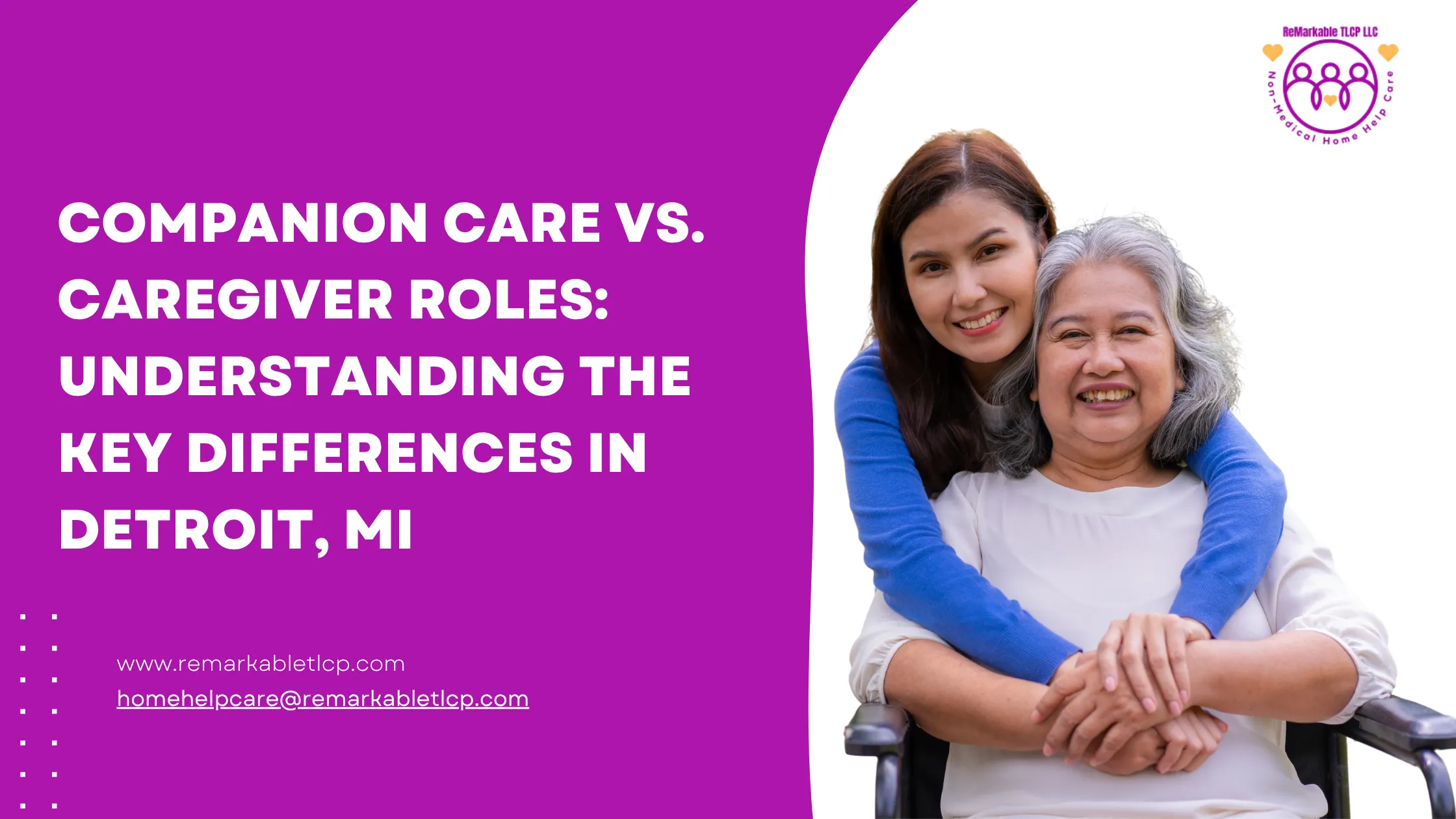When it comes to caring for a loved one, families in Detroit often ask the same essential question: What kind of support do we actually need — a companion or a caregiver?
At ReMarkable TLCP LLC, we regularly meet adult children, spouses, and family members who are navigating this exact decision. While both roles serve seniors and promote independence at home, they are not interchangeable.
In this guide, we’ll break down the true meaning behind companion care vs caregiver roles, how they differ in function, and which option might be best for your situation.
🧠 Defining Each Role Clearly
What Is Companion Care?
Companion care focuses on social, emotional, and environmental support for seniors who are relatively independent but may need encouragement, engagement, or simple help around the home.
Typical services include:
- Conversation and companionship
- Reading or board games
- Light housekeeping or laundry
- Meal prep and shared meals
- Help with organizing or writing letters
- Escorting to social events or doctor’s visits
Most importantly, companion care fights loneliness, boredom, and social withdrawal, especially for seniors living alone in Detroit.
What Is a Caregiver?
A caregiver or personal care aide offers hands-on physical assistance with tasks related to hygiene, safety, and health.
Common caregiver responsibilities include:
- Bathing and dressing
- Feeding assistance
- Toileting and incontinence care
- Help with mobility or transferring
- Basic grooming
- Medication reminders
Caregivers are best suited for seniors who require help with Activities of Daily Living (ADLs) and cannot manage essential tasks independently.
🔄 How These Roles Intersect — But Are Not the Same
At a glance, both companions and caregivers may assist with meals, appointments, or daily routines. But the level of training, touch-based assistance, and supervision separates them.
| Function | Companion Care | Caregiver Support |
| Physical hands-on help | ❌ No | ✅ Yes |
| Social/emotional engagement | ✅ Yes | ✅ Yes (but not primary role) |
| Certified training required | ❌ Not always | ✅ Yes (especially for hygiene-related) |
| Ideal for | Seniors needing engagement & routine | Seniors needing physical assistance |
| In-home support level | Light to moderate | Moderate to full assistance |
🧭 Detroit-Specific Care Challenges Families Face
Families in Detroit face unique realities that make this decision more urgent:
- Many elderly residents live alone in urban or subsidized housing
- Families are working long hours or live in other cities
- Mental health challenges such as grief, anxiety, and depression are common among seniors
- Detroit’s cold winters and public transport barriers make isolation worse
Choosing the right level of support can mean the difference between your loved one thriving or struggling in silence.
🧓 Real-World Examples: Which Role Fits Your Situation?
Scenario 1:
Your father is mostly independent but hasn’t been eating regularly, seems withdrawn, and isn’t leaving the house.
Best Fit: Companion Care. He needs interaction, reminders, and encouragement — not physical care yet.
Scenario 2:
Your mother uses a walker, needs help with bathing, and occasionally forgets medication.
Best Fit: Caregiver. She requires hands-on support to stay safe at home.
Scenario 3:
Your aunt is energetic and mobile but recently lost her partner and feels isolated.
Best Fit: Companion Care, possibly transitioning to Caregiver later as needed.
🧰 Can You Combine Both Services?
Absolutely — and in many cases, it’s the best approach.
At ReMarkable TLCP LLC, we often start families with part-time companion care and then gradually add personal care support as needs evolve. Our flexible care plans allow you to blend both roles without switching agencies or restarting from scratch.
Explore our personal care services and companion care services to see how they work together.
🔄 Why Families Get It Wrong — And How to Avoid Mistakes
It’s easy to assume that all care is the same. But choosing a caregiver when only companionship is needed (or vice versa) leads to:
- Wasted resources
- Frustrated seniors who feel misunderstood
- Unnecessary caregiver turnover
- Missed emotional or physical needs
At ReMarkable TLCP LLC, we guide every family through a detailed intake process to help them choose wisely and affordably.
🧩 Still Not Sure? Here’s How to Decide
Ask yourself:
- Is your loved one physically safe alone for several hours?
- Are they eating and taking medications regularly?
- Do they appear socially engaged or withdrawn?
- Do they express sadness, loneliness, or fear?
If the answers point toward emotional or social challenges, companion care is likely best.
If they point toward hygiene, feeding, or mobility concerns, it’s time for caregiver support.
📍 Why Choose ReMarkable TLCP LLC in Detroit?
Detroit families trust ReMarkable TLCP LLC for three key reasons:
- We don’t overprescribe care — you get what’s needed, nothing more.
- We offer flexible scheduling — hourly, daily, live-in, or weekend-only care.
- We serve all of Detroit and Wayne County with caregivers who reflect your family’s values, culture, and needs.
We also offer respite care if you’re caring for a loved one and need a short-term break without disruption.
👉 Visit our Facebook page to see how our team is making a difference in Detroit.
📞 Talk to Someone Who Understands Your Family
Every senior is different. Let’s talk about what your loved one needs and create a care plan that feels right, emotionally, physically, and financially.
📲 Call ReMarkable TLCP LLC at (313) 703-7015 for a no-pressure consultation today.🔗 Schedule your free companion or caregiver consultation and take the next best step.

